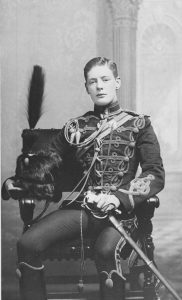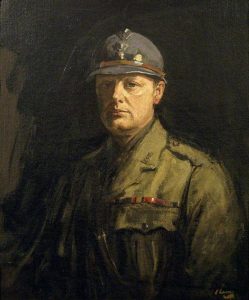
Finest Hour 181
Coming of Age in Afghanistan: Reflections of a Young Officer in the Scots Guards
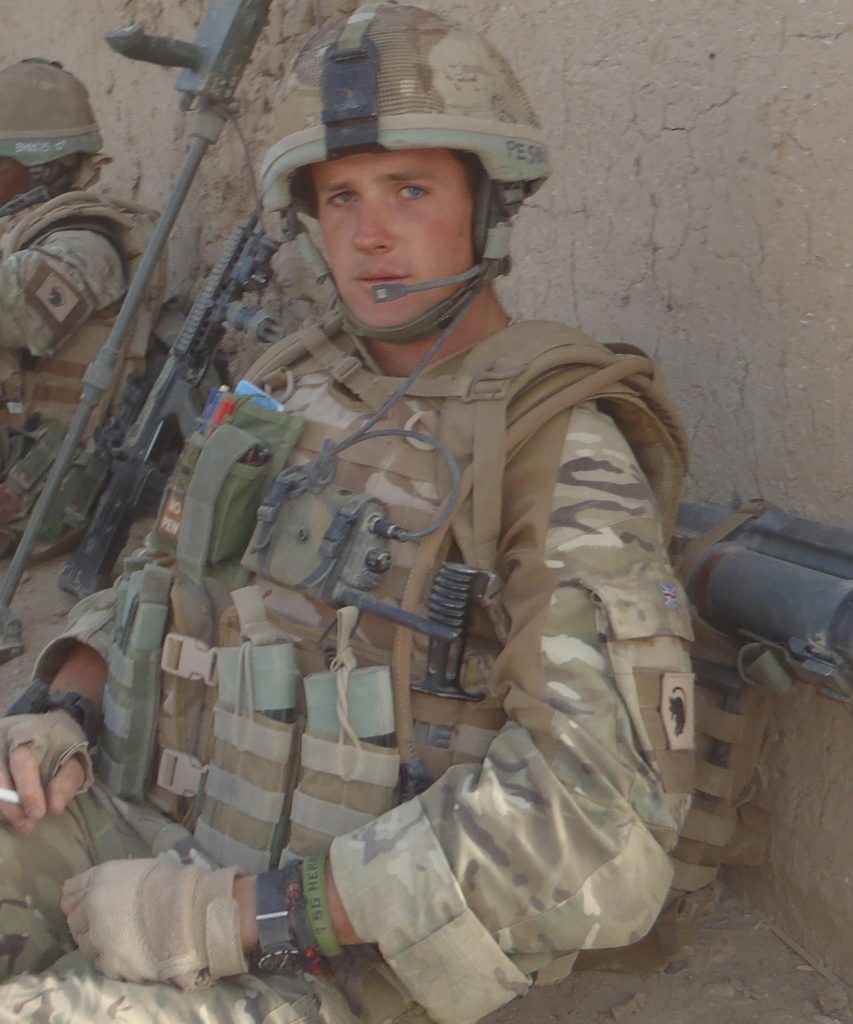
December 12, 2018
Finest Hour 181, Summer 2018
Page 31
By Alexander Perkins
A great-grandson of Sir Winston Churchill looks back on his own service in the British Army.
Alexander Perkins is a great-grandson of Sir Winston Churchill. He served in the Scots Guards from 2007 to 2013.
More than five years ago, after serving seven years in the British Army with the Scots Guards, I called it a day and have since started a career in the commercial world. As much as I love what I do now, hardly a day goes by when I do not think back to my time in the army. When asked to write about my military service, I felt mixed emotions. It was a great experience—but not always a happy one. That said, I would not trade any of it away, because I feel those times have made me who I am today.
In January 2006, aged nineteen, I began my military career as an Officer Cadet at the Royal Military Academy Sandhurst—the first of my great-grandfather Sir Winston Churchill’s descendants to attend his alma mater. Twelve months later, I was commissioned into the Scots Guards. What followed were six incredibly varied years. Over this time, I saw and did things that I could not have imagined at the start of the adventure. The highlights of my career were the two tours of duty I served in Afghanistan.

2025 International Churchill Conference
Training
To get to Afghanistan, however, I first had to complete the commissioning course at Sandhurst and the Platoon Commanders Battle Course (Infantry Officers Tactics) in Wales.
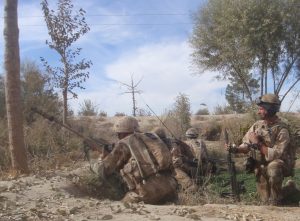
Sandhurst, very much like West Point, is steeped in history and tradition. Even as the military has evolved, many of the nuances that existed at Sandhurst a century ago are still there today. I was also very much aware of the time my great-grandfather had spent there. The largest building at the Academy is named Churchill Hall in his honour, and a great many leadership lessons at the academy use Churchill as an example. I look back on my year at Sandhurst with immense fondness. I made some great friends, and the experience laid some of the foundation stones of who I have become.
The remaining foundation stones were set in a far more realistic training environment: the School of Infantry in Brecon, Wales. For three months, both in Wales and Kenya, I was taught the finer points of soldiering and had instilled in me the ability to lead infanteers [British infantrymen] into very different combat situations. It was a tough three months but oh so valuable, considering the challenges I would face in Afghanistan just a bit more than twelve months later.
Deployment
As a young platoon commander fresh out of Sandhurst, all I wanted to do was to deploy on operations. My first posting, however, was to F Company, the Scots Guards Ceremonial unit in London—not exactly the theatre I was hoping for. Still there was a real chance I would get to deploy with the Battalion to Iraq later in 2007. When it became clear, however, that this was not going to happen, I decided to follow another of my great-grandfather’s examples and create my own luck. Success! With the help of my Company Commander and the Adjutant of my Battalion, I was released to deploy with 1st Battalion, The Rifles, to Afghanistan in 2008. Whilst the Scots Guards moved from Münster in Germany to Catterick in North Yorkshire, I would be commanding thirty or so Riflemen in the southern region of Helmand Province. My first experience in the field was to be in much the same area of the world where my great-grandfather deployed with the Malakand Field Force more than 110 years earlier in 1897.
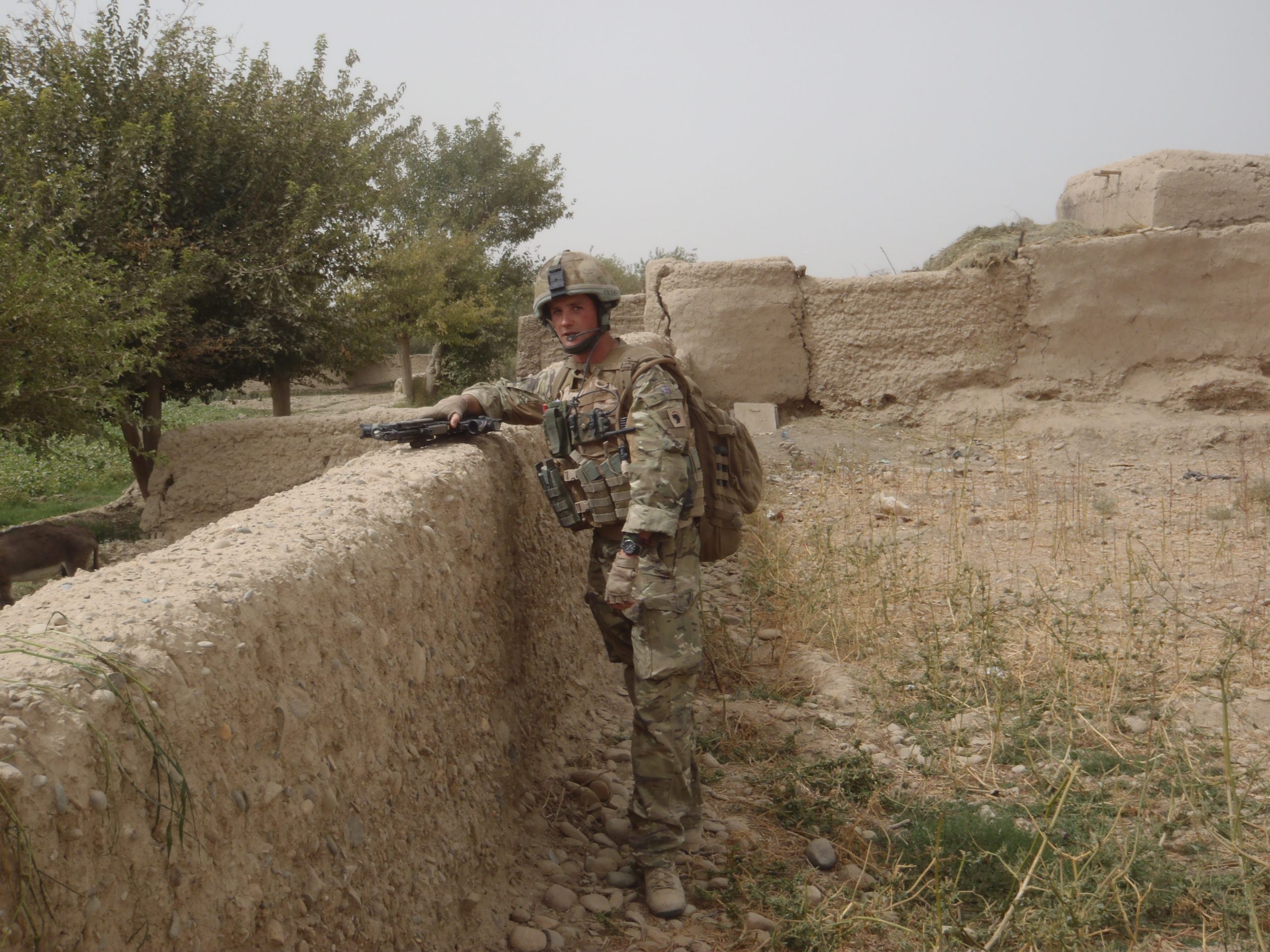
The next five months were spent in one of the most remote and primitive Patrol Bases not just in Helmand but possibly in all Afghanistan. From our arrival point at the main British base of Camp Bastion, it took approximately forty minutes’ flying time to reach our assigned territory. Our Company was stationed on the southern Patrol Base Line (PBL). We were the most southerly-stationed coalition troops in the province. Nothing lay between us and the Pakistani border. The PBL stretched from the eastern edge of the Green Zone (a lush, green expanse that borders the banks of Helmand River and is more than two kilometers wide in some places if the irrigation allows) all the way to the Helmand River itself. The region totals approximately 400 square kilometers. For a twenty-twoyear-old infantry platoon commander, this was just the sort of experience that I had been seeking.
Even though this was my first tour of duty, I was given a great amount of freedom in planning patrols and operations. There was a time in training when I really wondered if I would get the opportunity to put everything I was being taught into practice. After just a few weeks in Afghanistan, however, this was no longer a concern. There were times when I had to pause and take stock of everything before coming up with a plan. Then there were moments when my very survival relied upon the basic skills and drills that the Colour Sergeants at Sandhurst and Brecon drum into us.
Surprising Moments
I t is not just the soldiering moments, however, that I exclusively remember and look back on with amazement. One such moment happened in early 2009 during a company operation. We were told that we were pushing into areas where regular forces had never been. This became clear very quickly. It was not uncommon for us to be mistaken for Americans and—in some cases if we went far enough south—even Russians! On this particular occasion, however, some villagers had never seen a westerner at all. This was incredibly surreal but also fairly worrying. We were so far behind enemy lines that there was no regular pattern of operational life. As a result, everything was unpredictable. Our presence in this regionwas so surprising, and the enemy so comfortable in their surroundings, that part of my company managed to walk right through a Taliban shura (meeting) without realizing it. Inevitably, this tranquil and initially surreal situation came to an abrupt and unsurprising end.
Another moment that sticks with me was one of sadness but not surprise.
Haji, a local elder, was no saint, but he genuinely wanted change and was sick of the Taliban’s local rule. As a result, in the dark hours he would point out to us Taliban safe houses as well as local enablers. This information proved invaluable and led to strikes not just by us but also by Brigade and forces higher up the command chain.
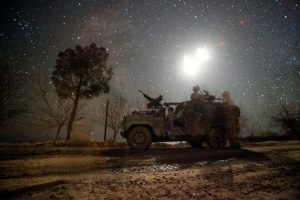
Unfortunately Haji pushed his luck, and on Christmas Eve 2008 I witnessed his funeral. At the time, I felt partially responsible: his final act in our support led to his death. In the middle of a freezing and dark December night, Haji came to help me drag my armed, but stranded and cut-down Land Rover out of a flooded field when no one else would assist. This, however, was the final straw. Two days later, whilst the entire company was fifteen kilometers away fighting through a Taliban stronghold, Haji was dragged from his car and executed.
The only reason I know how Haji met his death was due to one of the most remarkable things that happened to me in all my months of service in Afghanistan. When I attended his funeral, Haji’s two daughters, no older than thirteen, walked up to me and told me what happened. It was not what they said that shocked me; I had always imagined this day might come. Rather, I was overawed by their courage, struck by the fact that in a society where women are considered inferior and forbidden from speaking to males outside their family, these girls found the strength to come and speak to me. It was truly remarkable. I was sad that Haji was dead. We had become close, and he had helped us on many an occasion. In that moment with his daughters, however, and for the first time in months, I had a bit of hope that all we were doing and sacrificing might not be in vain. If those two little girls were willing to show the Taliban such contempt, surely there must be more. It was a Christmas Eve I will never forget.
Redeployment
At the end of the tour, I was sad to leave my men. We had been through so much together. We had stood shoulder to shoulder with one another in some of the most difficult circumstances, and we all very nearly made it out of there in one piece. I knew it was time, however, for me to return to the Scots Guards, and I was excited at the thought. It had been eighteen months since I had finished all my young officer courses, and I was finally joining the Battalion.
By the time I got back to the Battalion in late February 2009, we were preparing for our upcoming deployment to Afghanistan for the summer of 2010. I was excited to be going back and this time felt fully prepared for my second tour as an infantry platoon commander in Helmand. Alas, Headquarters had different plans for me. In Autumn 2009, I was sent to the training facility at Harrogate as a platoon commander. This left me devastated. Due to the ferociousness of the war, however, my time at Harrogate was cut short. I soon found myself back in Afghanistan with my old company, Left Flank, taking up the role of Company Operations Officer.
There was no other Company I would rather have gone back to. This was not just because of the individuals running the company. It had to do more with the guardsmen and non-commissioned officers who made it up. I had known a great deal of the young guardsmen in F Company and Battalion, and I was amazed at how they had changed. These young men, who at times had caused me nothing but problems as a young platoon commander, had been transformed by a brutal couple of months in Helmand. Due to their newfound maturity and exceptional leadership from both the commissioned and non-commissioned officers, these young men performed to the standard that you expect from a Scots Guardsman.
Reflection
The reality for me is that, whatever I do for the rest of my life, nothing will top leading thirty young, but highly trained, infanteers into battle when the right decision would result in success and victory and the wrong in failure and possible death. Nor will I forget the pride I experienced on being reunited with Left Flank. In my second tour, I had the chance to work alongside the young men whom I had first met all those years before on the drill square at Chelsea Barracks. This time, however, my men had been transformed and were now operating to the highest standards in a demanding and unforgiving environment.
When I look back at my time in the army, I feel a huge sense of achievement. Even though my career was relatively short, I feel that I lived and experienced more in those years than I will for the rest of my life. There are some moments that I will try to hold onto for eternity, and there are others I am desperately trying to forget. But that is all part of being a soldier.
Subscribe
WANT MORE?
Get the Churchill Bulletin delivered to your inbox once a month.

